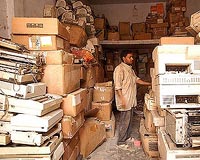 |
Corvallis OR (SPX) Aug 31, 2010 Much of the world's electronic waste is being shipped to China for recycling and the cottage industry that has sprung up there to recover usable materials from computers, cell phones, televisions and other goods may be creating significant health and environmental hazards. Scientists from China and the United States have identified numerous toxic elements in the emissions from an e-waste recycling workshop in southern China, which uses low-tech methods to separate reusable electronic components from the circuit boards. It is not an isolated case, the scientists point out; such methods are used all over China. Results of their study have been published in the journal Atmospheric Environment. "The most immediate problem is the health of the workers and the people who live in the city," said Bernd R.T. Simoneit, a professor emeritus at Oregon State University and one of the authors of the study. "But this may also be contributing to global contamination. For example, previous studies have found carcinogens in wind-carried dust from Asia." Simoneit is a widely published scientist who has been involved in numerous studies identifying chemical "signatures" for emissions, including coal smoke, biomass burning, petroleum-based fuels and even the burning of municipal refuse. By using mass spectrometers and other sophisticated instrumentation, the researchers can pinpoint the contributions of specific emissions to the atmosphere. Their work in China was conducted in Shantou City, a town of 150,000 people located in southern China's Guangdong Province. They collected samples during four working days, when workers were removing the electronic components by heating the circuit boards over grills on stoves burning coal briquettes. The workshop had 24 stoves along three walls, and an estimated five tons of circuit boards stacked along the fourth wall for processing. Workers would use the grills to melt the solder, and then remove reusable portions of the circuitry. The research team included five Chinese scientists and Simoneit, who has dual appointments in OSU's College of Oceanic and Atmospheric Sciences and the Department of Chemistry. The researchers found that through this "roasting process," numerous organic chemicals, heavy metals, flame retardants and persistent organic pollutants (or POPs) were emitted into the air via the smoke. The chemical signature created by this process of roasting or toasting circuit boards "is unmistakable." "The next step is to see to what extent this is harming the environment and creating a health hazard for both the workers, and people living in the path of the emissions - either through inhalation, or exposure to the skin," Simoneit said. "Some of these chemical compounds may be carcinogens; others may be just as harmful because they can act as 'environmental disruptors' and may affect body processes from reproduction to endocrine function." The Chinese authors of the study are affiliated with the Chinese Academy of Sciences and include lead author Xinhui Bi, with ZhenZhen Wang, Xinming Wang, Guoying Sheng and Jiamo Fu. Simoneit also is working with scientists in India to identify chemical signatures from the burning of wire and other materials, which is done to recycle copper and other minerals. And he is working in Saudi Arabia on a different problem - helping develop "green chemistry" methods for recycling that country's massive urban waste to create methane.
Share This Article With Planet Earth
Related Links Oregon State University Our Polluted World and Cleaning It Up
 China 'e-waste' recycling said hazardous
China 'e-waste' recycling said hazardousCorvallis, Ore. (UPI) Aug 26, 2010 Much of the world's electronic waste ends up in China for recycling, an activity creating significant health and environmental hazards, researchers say. Scientists from China and Oregon State University have identified toxic elements in the emissions from cottage-industry recycling workshops in southern China that use low-tech methods to separate reusable electronic components from circ ... read more |
|
| The content herein, unless otherwise known to be public domain, are Copyright 1995-2010 - SpaceDaily. AFP and UPI Wire Stories are copyright Agence France-Presse and United Press International. ESA Portal Reports are copyright European Space Agency. All NASA sourced material is public domain. Additional copyrights may apply in whole or part to other bona fide parties. Advertising does not imply endorsement,agreement or approval of any opinions, statements or information provided by SpaceDaily on any Web page published or hosted by SpaceDaily. Privacy Statement |